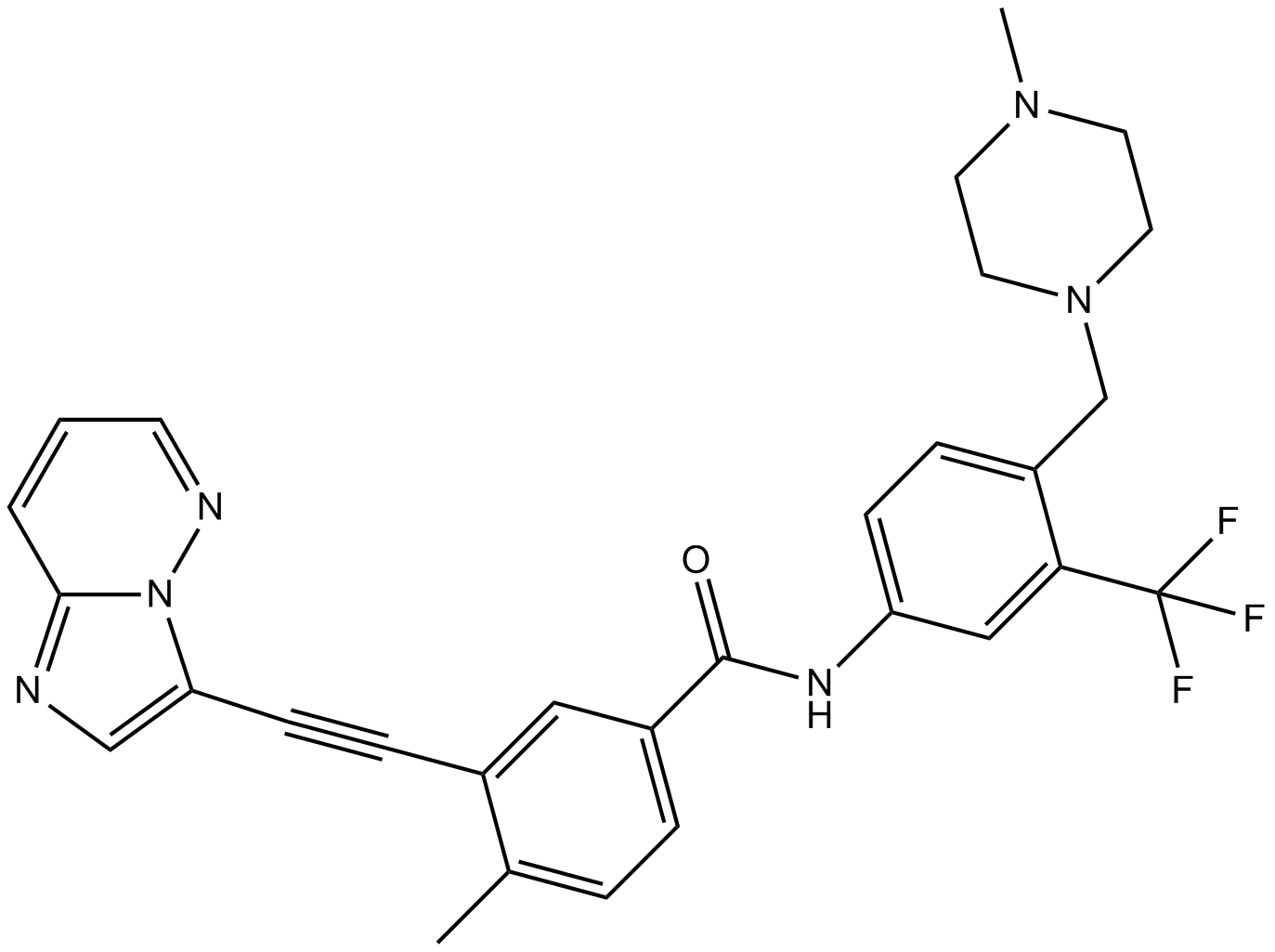Ponatinib (AP24534) (Synonyms: AP 24534) |
| Catalog No.GC14396 |
Ponatinib (AP24534) (AP24534) is an orally active multi-targeted kinase inhibitor with IC50s of 0.37 nM, 1.1 nM, 1.5 nM, 2.2 nM, and 5.4 nM for Abl, PDGFRα, VEGFR2, FGFR1, and Src, respectively.
Products are for research use only. Not for human use. We do not sell to patients.

Cas No.: 943319-70-8
Sample solution is provided at 25 µL, 10mM.
BCR-ABL fusion gene forms when the ABL gene from chromosome 9 joins to the BCR gene on chromosome 22. BCR-ABL is translated into a constitutively active tyrosine kinase, which is oncogenic. Depending on the fusion location, multiple protein variants are formed with molecular weight ranging from 185 to 210 kDa. BCR-ABL activates JAK/STAT pathway and MAPK signaling. [3] This gene is found in most patients with chronic myelogenous leukemia (CML), and in some patients with acute lymphoblastic leukemia (ALL) or acute myelogenous leukemia (AML).
Ponatinib is the second-generation pan inhibitor of BCR-Abl kinases, which is also effective against the mutant form of BCR-Abl (T315I). [1, 2] IC50 for WT and mutant form are 0.5 and 11 nM. [4] Ponatinib also inhibits several other clinically relevant kinases (RET, FLT3, KIT, PDGFRα, PDGFRβ, and FGFR1) in vitro, with IC50s of 5, 25, 100, 5, 9, and 23) in Ba/F3 cells lines. [4]
References:
1. Huang WS, Metcalf CA, Sundaramoorthi R, Wang Y, Zou D, Thomas RM, Zhu X, Cai L, Wen D, Liu S, Romero J, Qi J, Chen I, Banda G, Lentini SP, Das S, Xu Q, Keats J, Wang F, Wardwell S, Ning Y, Snodgrass JT, Broudy MI, Russian K, Zhou T, Commodore L, Narasimhan NI, Mohemmad QK, Iuliucci J, Rivera VM, Dalgarno DC, Sawyer TK, Clackson T, Shakespeare WC (June 2010). Discovery of 3-[2-(imidazo[1,2-b]pyridazin-3-yl)ethynyl]-4-methyl-N-{4-[(4-methylpiperazin-1-yl)
methyl]-3-(trifluoromethyl)phenyl}benzamide (AP24534), a potent, orally active pan-inhibitor of breakpoint cluster region-abelson (BCR-ABL) kinase including the T315I gatekeeper mutant. J. Med. Chem. 53 (12): 4701–19.
2. O'Hare T, Pollock R, Stoffregen EP, Keats JA, Abdullah OM, Moseson EM, Rivera VM, Tang H, Metcalf Ca CA, Bohacek RS, Wang Y, Sundaramoorthi R, Shakespeare WC, Dalgarno D, Clackson T, Sawyer TK, Deininger MW, Druker BJ (2004). Inhibition of wild-type and mutant Bcr-Abl by AP23464, a potent ATP-based oncogenic protein kinase inhibitor: implications for CML. Blood 104 (8): 2532–2539.
3. Cilloni D and Saglio G. Molecular pathways: BCR-ABL. Clinical Cancer Res (2011) 18(4):930-937
4. Gozgit JM, Wong MJ, Zhu X, Schrock AB, Chen T, Clackson T and Rivera VM. Ponatinib, a potent pan-BCR-ABL inhibitor, retains activity against gatekeeper mutants of FLT3, RET, KIT, PDGFR α/β and FGFR1. 2012 AACR poster.
Average Rating: 5 (Based on Reviews and 2 reference(s) in Google Scholar.)
GLPBIO products are for RESEARCH USE ONLY. Please make sure your review or question is research based.
Required fields are marked with *




















